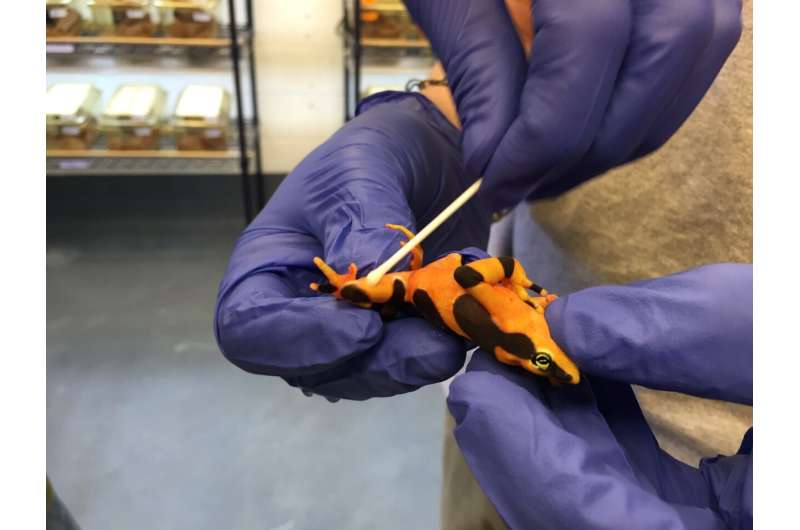Scientists from the Global South innovate to track ongoing amphibian pandemic

The Panama Amphibian Rescue and Conservation Center at the Smithsonian Tropical Research Institute (STRI) in Panama partnered with the Centre for Cellular and Molecular Biology in India to develop and validate a new test for chytridiomycosis strains, offering new insights into a wildlife disease that caused dramatic declines of over 500 amphibian species and the extinction of 90 others. Their novel assay, published in the journal Transboundary and Emerging Diseases, identified previously undetected Indian strains, and successfully detected strains from other parts of the world.
The new diagnostic assay was tested with frogs, toads, caecilians (limbless amphibians) and salamanders (tailed amphibians) in India, with comparable or even better results than the gold-standard assay recommended for the diagnosis of chytridiomycosis. Its effectivity was successfully verified in labs in Panama and Australia, proving it to be an affordable alternative for the widespread surveillance of chytridiomycosis in different parts of the world.
Rapid detection of chytridiomycosis is essential in managing and mitigating the disease. But ongoing research on this infection caused by two fungal pathogens reveals a complex, dynamically evolving genome. As new strains evolve in different parts of the world and spread through the global trade of amphibians, large-scale surveillance for emerging hybrid varieties is necessary. The newly developed assay will aid global detection, highlighting the value of international scientific collaborations in the search for solutions to a common threat.
“This assay will allow researchers to study and determine the spread of strains of the amphibian chytrid fungus that previously passed undetected, especially in countries around the Indian Ocean, where human trade has moved and introduced frog species,” said STRI scientist Roberto Ibáñez, who collaborated in the study.
The new test may also aid in the detection of pathogen reservoirs that have not been identified yet. That is, amphibian species that may be infected but do not show visible symptoms of disease or mortality and are able to silently transmit the disease to other susceptible species in their surroundings.
“One strain of the amphibian chytrid fungus caused dramatic population declines, even the disappearance of amphibian species in Panama,” said co-author Ibáñez. “The Chiriquí harlequin frog (Atelopus chiriquiensis) and the Panamanian golden frog (Atelopus zeteki) have not been seen for several years. A few species of frogs have reappeared in some localities, but they have not fully recovered their previous population levels. The amphibian chytrid fungus is still a threat for susceptible species in natural areas.”
The Smithsonian Tropical Research Institute, headquartered in Panama City, Panama, is part of the Smithsonian Institution. The Institute furthers the understanding of tropical nature and its importance to human welfare, trains students to conduct research in the tropics and promotes conservation by increasing public awareness of the beauty and importance of tropical ecosystems.
More information:
Gayathri Sreedharan et al, A Universal and Efficient Detection of Chytridiomycosis Infections in Amphibians Using Novel Quantitative PCR Markers, Transboundary and Emerging Diseases (2023). DOI: 10.1155/2023/9980566
Citation:
Scientists from the Global South innovate to track ongoing amphibian pandemic (2023, May 24)
retrieved 24 May 2023
from https://phys.org/news/2023-05-scientists-global-south-track-ongoing.html
This document is subject to copyright. Apart from any fair dealing for the purpose of private study or research, no
part may be reproduced without the written permission. The content is provided for information purposes only.
For all the latest Science News Click Here
For the latest news and updates, follow us on Google News.

